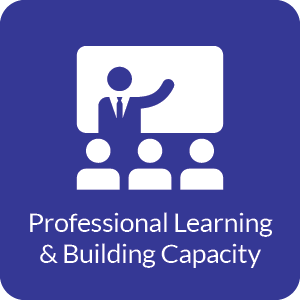
Lead with educator value, high quality for WI /national example, local direction on selection/connection to local district and educator goals
The Wisconsin Department of Public Instruction convened a workgroup of innovative districts, higher education institutions, DPI staff, professional organizations, and regional agencies to inform and identify a framework for leveraging micro-credentialing to personalize job-embedded professional learning. The workgroup's goal includes evaluating the current use of micro-credentials in Wisconsin districts, identifying Wisconsin connected course options and national providers, and providing a resource to district leaders. DPI is supporting platform and design-agnostic options to allow local flexibility in identifying quality and instructional design options to align with the local district or educators' goals.
Definition of micro-credentials
According to the National Education Association, "Micro-credentials are a digital form of certification indicating demonstrated competency/mastery in a specific skill or set of skills. To earn micro-credentials, educators identify competencies they want to master and complete the requirements to earn them."
-
Wisconsin Connections to Micro-credentials
Since there no longer is a professional development requirement for license renewal of teacher, administrator, and pupil services license, micro-credentials are not currently part of Wisconsin's educator licensing system.
However, Wisconsin school districts have local control to design and recognize professional growth models, competency levels of educations, and compensation models that can include micro-credential options. Districts can determine the transferability of credits and recognition of competencies. Educators motivated by skill development to impact student achievement may pursue micro-credentials as part of their personalized learning plans.
Districts interested in using micro-credentials may want to consider:
- creating teacher leader roles in which teacher leaders continue to teach yet are also given time and space to build performance assessment expertise with other faculty;
- reinventing professional learning communities so that teachers have time and agency to use micro-credentials to document impact and spread best teaching practices;
- adding options in compensation plans that recognize the attainment of micro-credentials as a means of demonstrating professional growth; and
- preparing administrators to work with teachers in using the evidence from micro-credentials to spread teaching expertise.
Micro-credentials can also support and document progress toward Professional Practice Goals (PPGs) in the Educator Effectiveness System.
-
Essential Principles of Personalized Professional Learning with Micro-credentials
Micro-credentials are part of an eco-system that include three distinct roles
- Issuers
- Earners
- Recognizers
Four characteristics distinguish the micro-credentialing approach from traditional professional development systems:
- Competency-based. Micro-credentials are earned on the evidence of teachers’ attainment of actual skills and abilities, not on the amount of seat time they’ve logged in their learning.
- Personalized. Teachers select micro-credentials to pursue on the basis of their own needs, their students’ strengths and challenges, school goals, district priorities, and/or instructional shifts. They identify specific activities that will support them in developing each competency.
- On-demand. Micro-credentials are responsive to teachers’ schedules. Educators can opt to explore new competencies or receive recognition for existing ones in any manner and time span they choose. They then upload evidence of proficiency using an online system.
- Shareable. Educators can share their micro-credentials across social media platforms, through email, and on blogs and résumés. As a result, micro-credentials can emerge as a shareable currency for professional learning.
-
MIcro-credential Course Providers
Wisconsin Micro-credential Course Options
National Micro-credential Course Hosts with much professional organization providers
^Note: DPI is supporting platform and design agnostic options to allow local flexibility in identifying quality options to align with the district or educator goals.
-
Literature Review and Resources
Digital Promise and Center for Teaching Quality. (October 2017). Teacher Micro-credentialing Movement Continues (Accessed September 5, 2019)
Digital Promise and Center for Teaching Quality. (June 2019). Micro-credentials and Education Policy in the United States Recognizing Learning and Leadership for Our Nation’s Teachers (Accessed September 10, 2019).
National Education Association. Micro-credentials Guidance. (Accessed October 5, 2019)
The NEA also released a summary document to assist local district teams in understanding the potential of micro-credentials.
North Carolina Department of Instruction. Micro-credentialing in North Carolina (Accessed October 5, 2019).
Voigt, Alyssa. (2019, February 22) A Teacher-Centric Approach to PD. Edutopia. (Accessed October 13, 2019).
